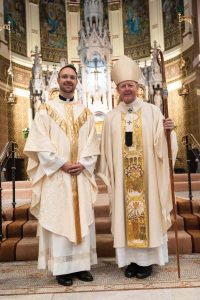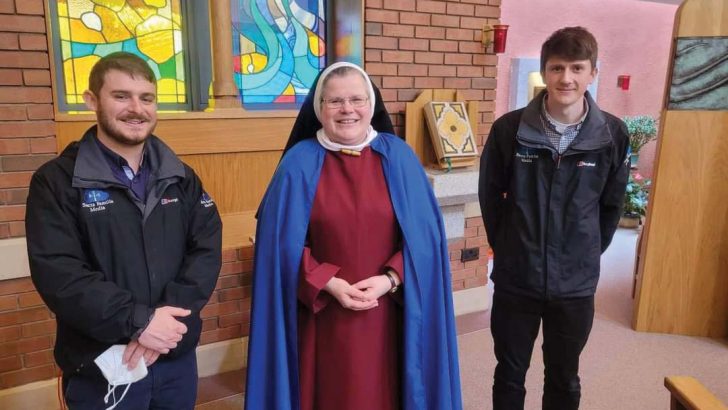Vocational Supplement
Ireland’s hostile media landscape can make promoting religious vocations difficult, Chai Brady hears
The Church’s long history across the world has been punctuated with tremendous growth and decline, despite these swings and roundabouts there has always been those who felt a calling to enter religious life – even though the numbers sometimes dwindle.
In response to Pope Francis, Vocations Ireland are focused on promoting a culture of vocation in a challenging societal landscape.
Margaret Cartwright, Director of Vocations Ireland, tells The Irish Catholic the Pope “clearly wants us to encourage young people, and people in general, to be able to respond to their own personal vocation”.
While the decline in vocations in Ireland has been rapid over the past number of decades, Vocations Ireland has noticed a modest increase, particularly among the contemplative female congregations.
“In Ireland there is an increase in vocations, we’ve had two ordinations this year, which means they’ve gone through the whole six-year process,” Ms Cartwright explains.
“There has been a number of first professions and young women in particular entering the novitiate. It’s interesting, there’s a particular growth among the contemplative orders and I think that’s coming out probably from the fact that people are realising there’s more to life than just making money.”
Increase
“It’s only a small increase but that doesn’t matter, numbers are not important, what’s important is that call is still very much alive and at the end of the day it’s not us that calls, it’s God that calls so we have to be aware of that and encourage young people, and people to look at where their path in life is.”
She continues saying that what young people are looking for today is “prayer, a deeper faith experience and a sense of community”, all of which are very much alive in contemplative orders.
All the interest in vocations hasn’t just been for contemplative nuns but several orders are seeing a heightened interest.
“It’s interesting, I suppose when you look through history it’s been swings and roundabouts all the time, some orders have grown, some haven’t, and then the next couple of years it might be the other way around,” Ms Cartwright adds.
There are currently nine men who have expressed interest in the Capuchin Franciscans in Dublin who are being supported on their discernment journey.
Fr Martin Bennett OFM Cap. said that the majority of those interested were attracted to the order either because of saints connected to the order – Padre Pio being the main attraction – or their charitable works such as the Capuchin Day Centre for homeless people.
“Ultimately, it doesn’t matter who they are, what age they are or where they’re coming from, they’re all people who feel some sort of a need inside themself to live a life, they feel, is more authentic to who they are as human beings,” Fr Bennett says.
“Our way of life is one based in community, we live together as friars, it’s a particular way of living a vocation, it’s not for everybody so that’s why it’s important when we invite these people along that they get a sense of that, they get an experience of it.”
The nine men they are currently speaking to are all different ages, from different backgrounds and have varying life experience. The one thing they have in common is the “desire to dedicate their lives to serving God and the Church”.
The Capuchin Franciscans look for pople who would work well living in community taking into account both the “joys and challenges” according to Fr Bennett, who added they would also need to be open to self-development “which is what community life is all about”.

The person would need a spiritual core, they would spend time in prayer, go to Mass and are interested in developing their spiritual side. In addition, Fr Bennett underlines the fact they are not monks, their ministry is active which could see a person based in a parish, hospital, community, working with children and more.
However, Fr Bennett adds that no one is expected to be perfect and the formation process is there for a reason.
Those putting themselves forward may not have mentioned it to any of their loved ones with Fr Bennett saying: “Oftentimes people come to us as vocations contacts and it’s secret, they haven’t spoken to anybody, they haven’t told anybody about this, they keep it to themselves and that’s a lot of pressure.
“If there was a more open conversation that could happen around that, maybe people would see it as a more viable option. I think that is what he is encouraging, I think that is what Pope Francis is encouraging, don’t be afraid to talk about these things or encourage somebody to go for it if they want it. If it doesn’t work it doesn’t work.”
He adds: “I know from my own experience, if you don’t express it you’re going to repress it and you’re going to be unhappy inside yourself. Even if nothing comes of it, I think it deserves to be looked at and the person deserves to be listened to.”
The Presentation Sisters are also actively promoting the congregation across Ireland and are hoping for vocations.
Sr Concepta O’Brien PBVM tells The Irish Catholic that there are and have been professions, with one sister soon to make her final profession. She says the guiding age limit are women from 20-45 and they are looking for people who have an “emotional, psychological and spiritual balance in life”.
“We’re sowing the seeds and we’re looking at ourselves as Presentation Sisters, what are we to contribute to the world. At the moment, with the Ukrainian crisis, we’re quite involved,” she says.
For example, a convent which was the home of the Presentation Sisters for more than 150 years, in Fethard, Co. Tipperary is now accommodating 55 refugees fleeing the war in Ukraine.
“We were looking at the local community taking it over for a day-care centre and all of that kind of thing and in the meantime now, due to the Ukrainian crisis, the community have worked very hard with us to set up the place,” Sr Concepta explains.
Future
“We’re looking at the way we are, we’re using the word transformation and how we see ourselves in the future. We have a project with UCD, we’re also sponsoring Christian leadership in MIC [Mary Immaculate College] and in DCU we’ve given some money to promote research around parish life. There’s a lot of life going on. We’ve also been working closely with the Peter McVerry Trust as well.”
Asked why she believes a young woman who feels a calling to religious life should consider the Presentation Sisters, she says: “Nano was a woman who saw a need at the time, which was education really for the marginalised, so our focus would be looking at those who are less well off, marginalised, migratory. There is a great opportunity to respond to the Ukrainian crisis at the minute, but there’s also a lot more than Ukrainian people around.
Sr Concepta continues: “The most important thing is the basis on which we go out to work, which comes from our community life and living and praying together. Our faith and our relationships – they’re normal relationships we’re not perfect – are the basis on which we would swing forth and do whatever work that needs to be done. It’s Gospel-based no matter what, but maybe in a certain direction as our foundress would have.”
Promoting
Religious orders, while promoting vocations, continue to cater to the needy and those forgotten or ignored by society. A plethora of work is being done to alleviate suffering but much of this is not known by Irish society.
Ms Cartright says that Vocations Ireland have tried to approach the media to highlight some of the good news stories associated with religious orders.
She says: “I think Ireland itself has become quite secular so they [secular media] are not really interested in the religious side of things. I think definitely in places it’s hostile, very much so. They hook on to the big stories and try to get the gritty bits out of it and it keeps getting repeated but they’re not bringing in the new stories, the very positive things that are happening around the country.
“There are 40 congregations at the moment who have provided accommodation for Ukrainians coming into the country, whether that be a bungalow or an apartment that a congregation has had the use of or whether it is a school that’s closed down or a nursing home that’s closed down, they’ve given over that to house Ukrainians and they have provided other materials too.
“I think the important thing is that there are still congregations who are very much alive, who are doing wonderful ministry both here in Ireland and abroad and are responding to the needs of the times, and that’s what’s important.
Vocation Ireland are currently doing research to ascertain in more certain terms the lay of the land regarding the numbers of people making enquiries, those who have entered formation and who left and why and also the numbers of people who have stayed and why they stayed.
Regarding Ms Cartwright’s hopes for the future of vocations in Ireland, she says: “My hopes are that anybody who is looking at their path in life, that they can really be the best they can possibly be and whatever path that is, they can do that to the best of their ability.
“We all need to look, starting out from our own vocation as baptised Christians, what are we doing with our life? Are we really living that to the full? Pope Francis will challenge young people and he will ask them, ‘is this the path you’re meant to follow?’, and I think we have to have the courage to ask that question and it can be a hard question to ask people.”


 Chai Brady
Chai Brady Sr Helen making her First Profession
with the Redemptoristines.
Sr Helen making her First Profession
with the Redemptoristines.